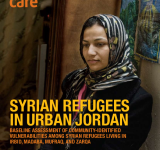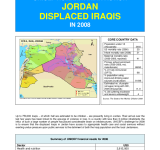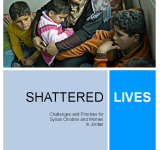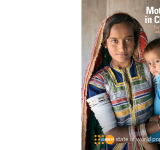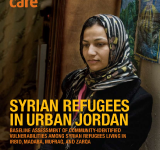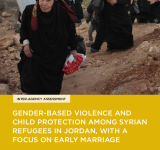psychosocial
The UNICEF Syria Crisis is a series of bi-weekly report that provides a summary of the humanitarian situation in Syria and development of the organization’s projects in the regions including Syria;; Lebanon;; Jordan;; Iraq;; Turkey and Egypt. The report contains an overview to the changing situations and humanitarian needs of the crisis. It focuses on the results and progress of the UNICEF projects in partnership with other local agencies in each country. These projects aim to ensure sustained access to safe water and sanitation;; provide psychosocial support;; vaccination and school supplies for children and support camps and host community schools for increased school enrollment. Relevant figures that summarize and evaluate the development of ongoing programmes can also be found in the report.
The aim of the report is to identify the critical issues of the Iraqi refugees in 2008;; especially the vulnerable groups of children and women and their humanitarian needs. The report examines the lack of legal framework in Jordan to identify the status of Iraqi refugees and obtain quantitative information about them. Additionally;; it looks at other urgent issues including unemployment;; lack of access to education and health care and high level of post-traumatic stress syndrome among the refugees. The report summarizes key actions and achievements of the UNICEF in 2007. It also includes the organization’s plans for the humanitarian action in areas of health and nutrition;; education;; and child protection in the following year in response to the urgent issues.
With an executive summary on the Syrian refugees situation in Jordan;; the report combines the conclusions of detailed assessments in various areas including as child protection and gender-based violence;; education;; water sanitation and hygiene;; and nutrition and health. It provides a holistic picture of the situation faced by Syrian children and women in Jordan to draw out recommendations for necessary plans of action. Some key findings of the report include growing challenges for water;; sanitation and hygiene situation in Za’atari camp;; several threats to the nutritional status and health of Syrian girls;; boys and women and increasing violence against adolescents. Bringing together the voices of children and women at the camps;; the report examines the situations of Syrian refugees in host communities and refugee camps and finds key recommendations based on them.
يبرز تقرير حالة سكان العالم 2013;; الصادر عن صندوق الأمم المتحدة للسكان;; التحديات الرئيسية المتعلقة بحمل المراهقات وآثاره الخطيرة على تعليم الفتاة;; وصحتها;; وفرصها في العمل في الأجل الطويل. ويبين التقرير أيضا ما يمكن القيام به من أجل الحد من هذا الاتجاه وحماية حقوق الإنسان الخاصة بالفتيات ورفاهتهن.
This report is a baseline assessment of community-identified vulnerabilities among Syrian refugees living in Amman;; Irbid;; Madaba;; Mufraq;; and Zarqa. The purpose of this report is to identify urban Syrian refugees’ current coping mechanisms and any gaps in services available to Syrian refugees in Jordan. The research methodology is both qualitative and participatory in design;; drawing from the UNHCR tool for Participatory Assessment in Operations. This report presents only the data from household interviews;; baseline assessment;; and the follow-up focus groups conducted with community members. The number of households surveyed was 240;; with a total number of 1;;476 household members and 89 focus group participants representing 534 household members. The report proposed general recommendations and interventions to deal with the main highlighted challenges (cash assistance;; strengthening community links;; vocational training;; physical activities ...etc).
The report aims to address the particular needs and cultural dynamics of Syrian refugees residing in Jordan;; especially with regards gender-based violence and child protection issues. It presents a comprehensive range of perspectives from urban Syrian refugees and local Jordanian decision makers in government;; community-based organizations and the religious and education sectors. The assessment of this report is based on data collected through three methodologies including questionnaire survey to refugees outside the Za’atari refugee camp;; focus group discussions in regions across Jordan and in-depth interviews. Key findings of the report are 1. The rates of early marriage are high;; 2. A significant percentage of children contribute to the household’s income and 3. Restrictions on women and girls’ mobility constrain their participation in social and economic activities and access to basic services. The report recommends measures to prevent acts of sexual exploitation and abuse and ensure the needs of the most vulnerable members of the Syrian refugee population in the cities.
